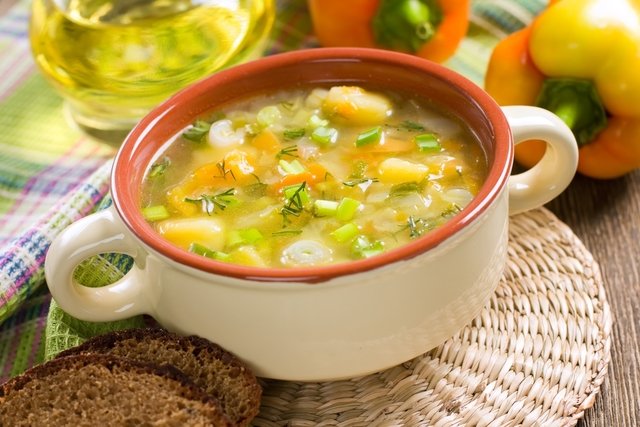The colonoscopy prep diet should start 3 days before the procedure. It should be light and prioritize foods such as white rice, mashed potatoes, shredded cooked chicken or soups. This diet is low in fiber, which reduces the volume of stool.
The objective of this diet is to reduce food waste, and cleanse the gut, so that the intestines are clear during inspection and intestinal wall changes can be observed.
To prep for a colonoscopy, the doctor also prescribes laxative solutions to help clean out the intestines.

What to eat
The colonoscopy diet should be started 3 days before the exam and is divided into 2 phases:
1. Semi-liquid diet
The semi-liquid diet should be adhered to on the third and second day prior to the exam. The types of food prioritized at this stage are:
- Fruit without its peel or seeds, preferable cooked. Examples include apples, pears and bananas.
- Peeled and cooked vegetables, such as carrots, chayote, potatoes, pumpkin, zucchini, yams and sweet potatoes.
- Non-whole grains, such as white rice, white bread and white pasta;
- Skinless, fat-free proteins, including chicken and fish, which should be ground or shredded to facilitate digestion.
In addition, you can consume teas, coffee and coconut water. You are advised to drink plenty of water.
2. Liquid diet
The day before the colonoscopy, you should adhere to a liquid diet made up of fat-free soups or broths. These can be made with vegetables and proteins, but should be strained, as solid foods should not be ingested.
You can also consume strained, light-colored juices, light-colored gelatin, water, coconut water and light teas, such as chamomile, anise or lemon balm.
Foods to avoid
Foods that should be avoided 3 days before a colonoscopy include:
- Red meat and sausages
- Herbs and leafy greens such as lettuce, parsley, coriander, basil, kale and arugula
- Raw fruits and vegetables with skin and seeds
- Dairy products, such as milk, yogurt, butter and cheese
- Legumes, such as beans, soybeans, chickpeas, lentils and peas
- Seeds such as linseed, chia seeds and sesame seeds
- Whole grains, such as brown rice, oats, corn and whole grain bread
- Oilseeds such as peanuts, walnuts and chestnuts
- Fatty foods, such as lasagna, pizza, chili, and fried foods
- Alcohol, such as beer, wine, sparkling wine and vodka
In addition to this list, you should also avoid papaya, passion fruit, orange, tangerine or melon, as they are fruits that rich in fiber, which add bulk to the stool.
Meal plan
The following table outlines a sample 3-day meal plan or a colonoscopy prep diet:
It is important to remember that on the day of the exam, you should only drink water and light-colored teas up to 4 hours before the scheduled exam time.
What to eat after a colonoscopy
After the exam, it is important to maintain a light diet, to drink plenty of fluids and to avoid high-fat foods.
The gut takes around 3 to 5 days to start working normally again. It is common to experience abdominal discomfort and bloating in the belly during this time. Therefore, you should avoid foods that cause gas within 24 of the exam, such as beans, lentils, peas, cabbage, broccoli, kale, eggs, sweets, soft drinks and seafood. Checkout a complete list of foods that can cause gas.
